

To build and maintain customer relationships in the highly competitive SaaS space, you want things to be as easy as possible. But customer relationship management (CRM) systems usually aren’t easy.
In the past, CRM systems were often custom-built, bespoke tools that had to be installed on the premises. While that might sound fancy, it comes with lots of problems—especially if the company that built it is no longer in business.
The alternative was a complicated web of spreadsheets, which isn’t ideal for any business. ?️
Luckily, there are now plenty of software as a service (SaaS) CRMs on the market to streamline your sales process and build better relationships with your clients. And they do it all from the cloud, with the stability, reliability, and ease of access it brings.
It can be daunting to find the right CRM system for your SaaS business. That’s why we’ve done the research for you. ?
Here are the top SaaS CRM tools in 2024 to handle all your customer information.
What is SaaS CRM?
SaaS CRM is a type of cloud-based tool that helps businesses manage and analyze their interactions and relationships with customers. It allows SaaS companies to store and organize customer information in one central location, making it easily accessible for sales teams, marketers, and customer support.
What Should You Look for in a SaaS CRM?
Every SaaS team has different needs, but it helps to compare CRM software examples with an idea of what the best-in-class tools have.
When you’re evaluating CRM platform options for your SaaS business, consider:
- Features: Does the tool have the specific must-have features you want, like lead scoring or marketing automation?
- Cross-team functionality: Do you need sales, service, and marketing in one place? Or does your SaaS company outsource some of these areas?
- Pricing: Is the tool affordable? Is there a monthly payment option?
- Speed: Does the SaaS tool run quickly and with no loading issues, allowing you to keep your own operations running smoothly?
- Compatibility: Does the SaaS CRM integrate well with your other tools?
- Scalability: Can the CRM tool scale with you as your SaaS operations grow?
As with any software tool, finding the right SaaS CRM software provider starts with considering your needs. If you need a sales-focused CRM, consider one that’s dedicated to pipeline management or closing deals. Or if you need your marketing and customer service operations in the same platform, look for an app that features both. ?
The 10 Best SaaS CRMs to Use
Find your way to the best CRM for SaaS faster with our handpicked guide to the best SaaS CRMs for 2024.
1. ClickUp
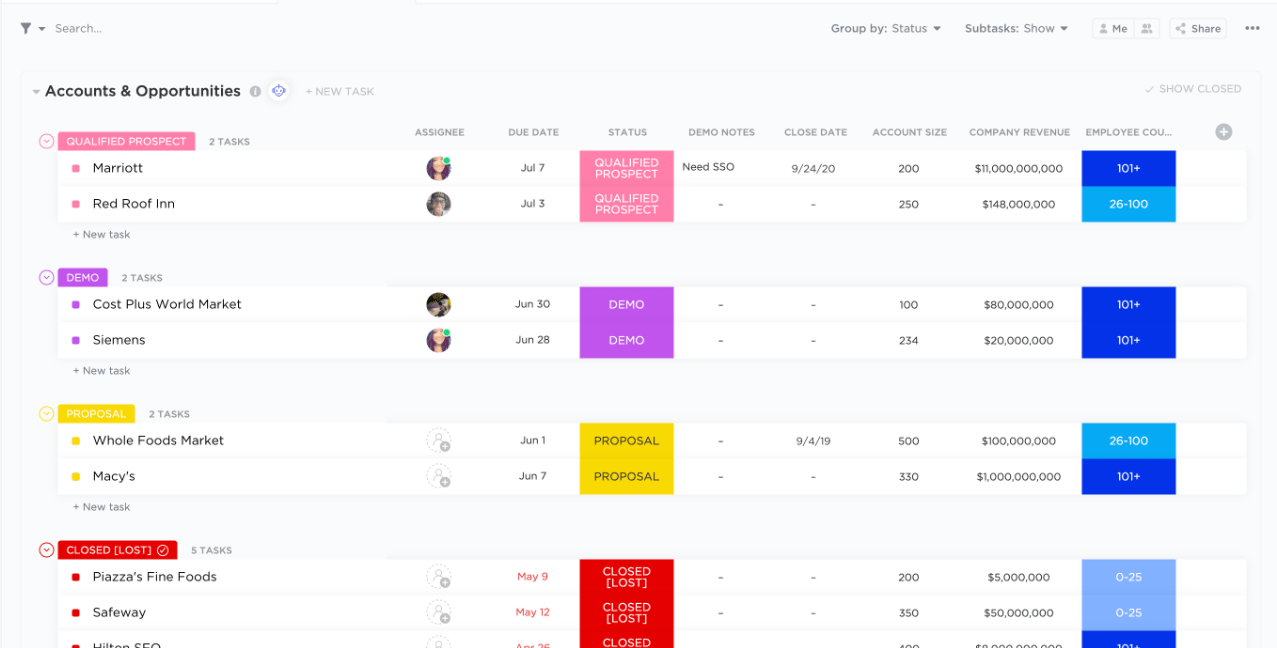
Say hello to a better approach to SaaS CRMs with ClickUp—the all-in-one work platform. ClickUp’s CRM accelerates customer growth, enhance customer satisfaction, and introduce business process efficiencies.
Use ClickUp to visualize your sales and lead pipelines, streamline workflows, and work together with your team to create better client experiences. All you need is the CRM Template by ClickUp to get started.
Use this template to see your customer relationships at a glance across more than ten different views. Track progress and work your way—whether that’s with a List view, Calendar view, or a Kanban board.
Measure impact and track a customer’s lifetime value, deal sizes, and more with our built-in Dashboard widgets. See all your customer data in one place so you make better decisions and make the most of new opportunities.
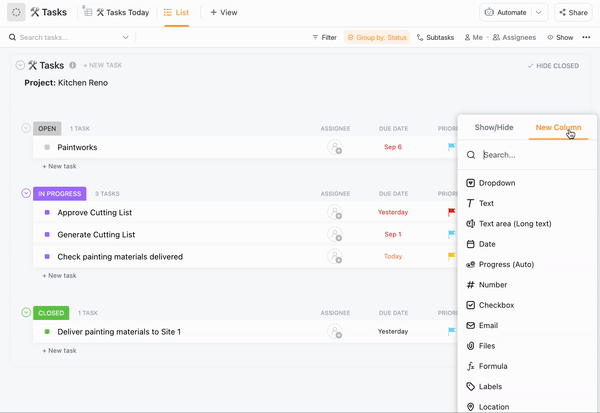
Break through silos and enhance marketing and sales team collaboration by integrating your emails with ClickUp. Send updates to clients, discuss leads with team members, and onboard customers from one single platform.
ClickUp gives you not only a place to store contact data but a feature-rich hub where you can make smart decisions about how to use it.
Combine our CRM features with our task management, resource management, and enterprise collaboration tools to enhance your work experience and achieve greater results. ?
ClickUp best features:
- Simplified account management with folders and lists
- Custom fields that help you track orders, leads, scoring, and more
- Team collaboration and chat to discuss leads and opportunities
- Built-in Docs for creating project reports, proposals, SOPs, and more
- Numeric fields allow you to quickly total contract values, revenue, and more
- Built-in sales and pipeline management with custom status workflows
- Assign comments to team members and clients for faster approvals
- Custom tags allow you to sort, filter, and organize your tasks
- Link similar tasks and create dependencies to set a clear order of operations
- Use location data to sort accounts and understand where they’re based
ClickUp limitations:
- With so many features, it may be overwhelming to new users at first
- Some users report challenges matching formatting when importing data from their previous CRM
ClickUp pricing:
- Free Forever
- Unlimited: $7/month per user
- Business: $12/month per user
- Enterprise: Contact for pricing
ClickUp ratings and reviews:
- G2: 4.7/5 (8,300+ reviews)
- Capterra: 4.7/5 (3,700+ reviews)
2. Zendesk Sell
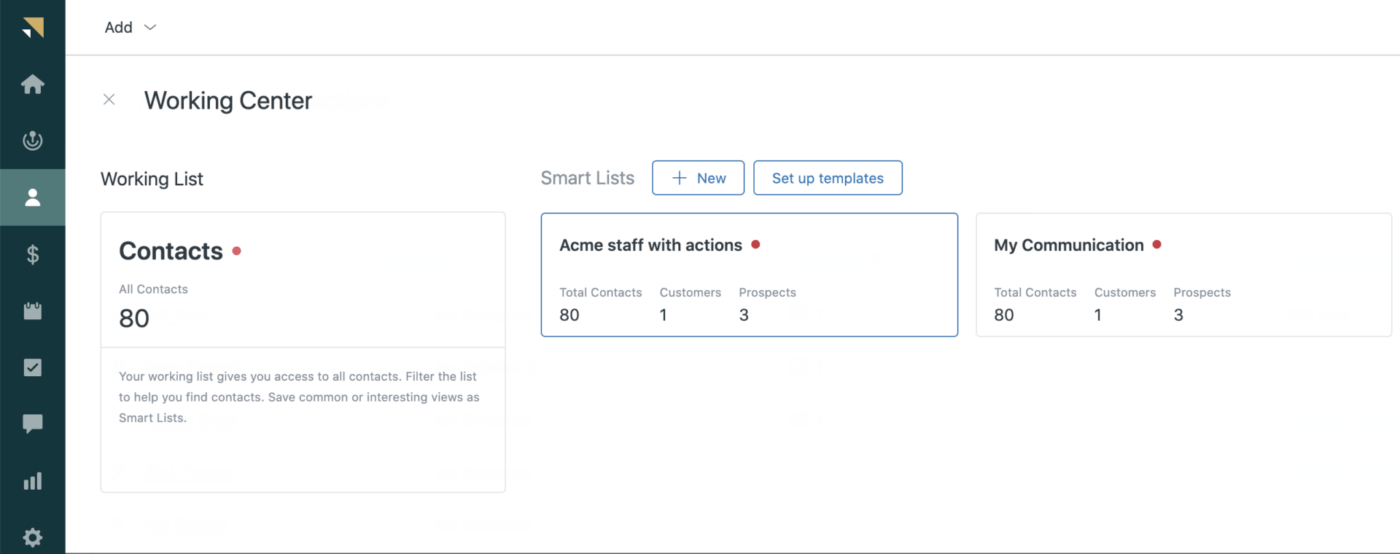
Zendesk Sell is the company’s answer to a modern SaaS CRM solution. The tool is designed to help you be more productive, oversee your sales pipeline, and grow your revenue.
Features like contact management, lead management, activity tracking, lead generation, and analytics are all included. The CRM for SaaS tool also links with Zendesk’s help desk platform, allowing your sales reps to manage leads and service clients more effectively. ✅
Zendesk Sell best features:
- Core CRM capability with added marketing features
- Ability to track users who visit the site thanks to GPS tracking
- View all your lead’s information and customer data on one page
Zendesk Sell limitations:
- Some users find the user interface less modern than other competitors
- There may be some challenges integrating with email systems
Zendesk Sell pricing:
- Free trial available
- Sell Team: $25/month per agent
- Sell Growth: $69/month per agent
- Sell Professional: $149/month per agent
- Sell Enterprise: starts at $169/month per agent (contact for custom pricing)
Zendesk Sell ratings and reviews:
- G2: 4.2/5 (470+ reviews)
- Capterra: 4.3/5 (100+ reviews)
3. Pipedrive

Pipedrive touts itself as the first SaaS CRM designed by salespeople. It’s focused on viewing, managing, and optimizing your sales pipeline management and sales funnels.
Reminders and alerts help you keep track of deals, project controls, and sales forecasts automatically update so your view is always up to date. The platform also uses AI tools to suggest opportunities for startups in the sales process that you might not have considered. ?
Pipedrive best features:
- Holistic view of the entire sales process and pipeline
- Detailed reporting and analytics features including customer data
- Option to automate areas of operations, like email marketing
Pipedrive limitations:
- There are limited options when it comes to adding custom branding to the platform
- Some users wish there were more varied support options for its CRM software
Pipedrive pricing:
- Free trial available
- Essential: $21.90/month per user
- Advanced: $37.90/month per user
- Professional: $59.90/month per user
- Power: $74.90/month per user
- Enterprise: $119.00/month per user
Pipedrive ratings and reviews:
- G2: 4.2/5 (1,600+ reviews)
- Capterra: 4.5/5 (2,800+ reviews)
4. Salesforce Sales Cloud
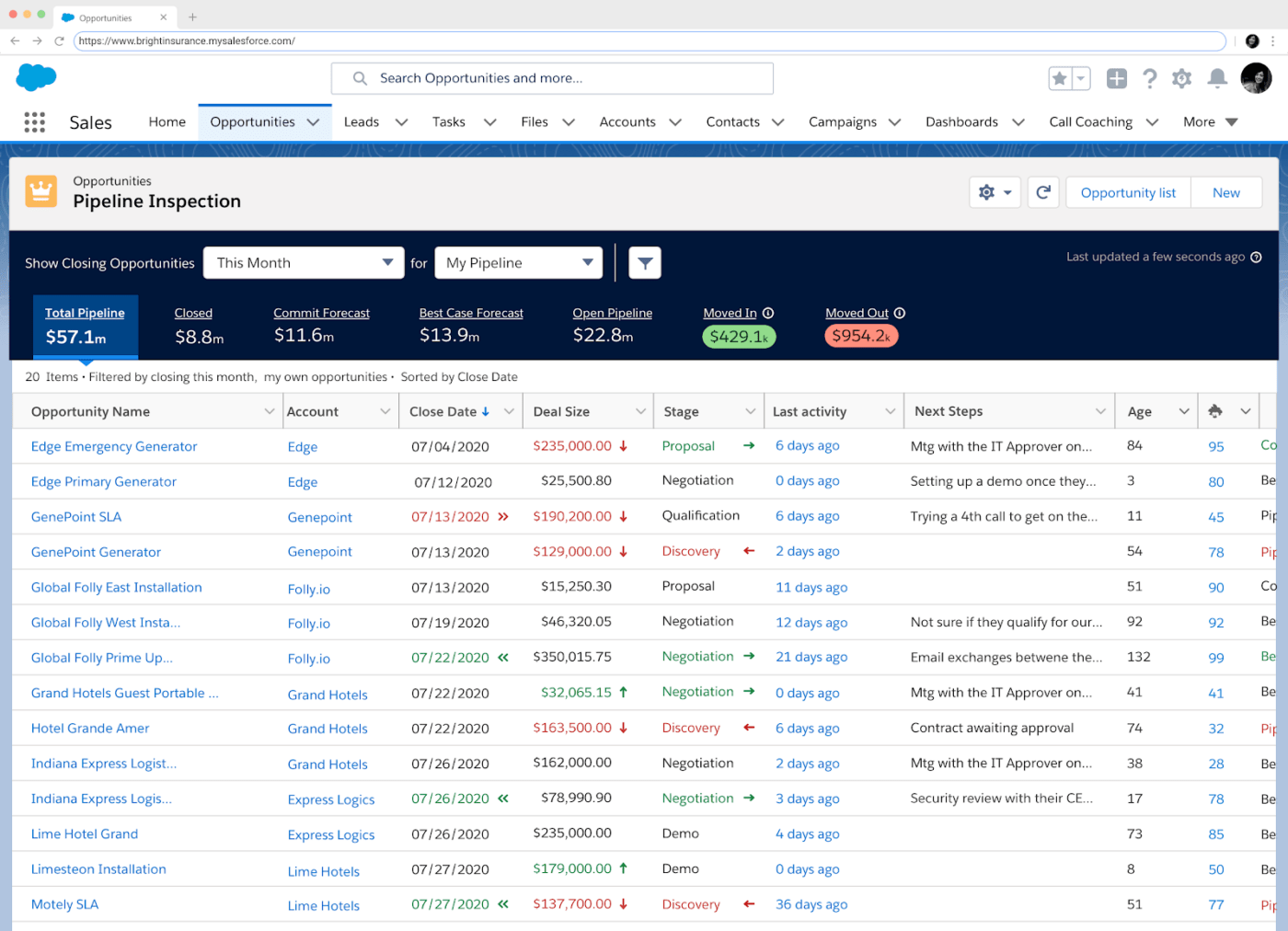
Sales Cloud is Salesforce’s purpose-built customer relationship management tool for storing contact information and optimizing sales management.
Like all good SaaS CRMs, Salesforce Sales Cloud makes it easy to track opportunities, leads, and deals. The tool centers on efficiency, with features like intelligence insights, forecast management, and sales automation that streamline processes and workflows. ✨
Salesforce Sales Cloud best features:
- User-friendly dashboard and interface to track the entire sales cycle
- Prompts to help you follow up with leads at the optimum time with sales forecasting features too
- Access to a marketplace of apps and SaaS crm solutions to improve sales processes and increase customer retention
Salesforce Sales Cloud limitations:
- While it’s often marked as the best CRM, there are issues with lag and speed at times
- Some users report a steep learning curve due to the number of features
Salesforce Sales Cloud pricing:
- Free trial available
- Starter: $25/month per user (billed annually)
- Professional: $75/month per user (billed annually)
- Enterprise: $150/month per user (billed annually)
- Unlimited: $300/month per user (billed annually)
Salesforce Sales Cloud ratings and reviews:
- G2: 4.3/5 (15,600+ reviews)
- Capterra: 4.4/5 (17,000+ reviews)
Check out these Salesforce alternatives!
5. Microsoft Dynamics 365
Dynamics 365 is Microsoft’s suite of business management tools, which includes a sales platform designed to give you a better view of the customer journey. The sales cycle tool is used by sales reps and SaaS companies to for sales forecasting and CRM strategies.
Microsoft Dynamics 365’s Sales feature lets you manage and predict pipelines, analyze metrics, and streamline sales cycles with AI—all the tools you need to win new customers. ⚒️
Microsoft Dynamics 365 best features:
- Integrate smoothly with Microsoft Office
- Easy scalability to match the growth of your business
- Sophisticated reporting and analytics tools
Microsoft Dynamics 365 limitations:
- Some users find the customer engagement options to be lacking within the CRM software
- The system feels slow at times, some users report
Microsoft Dynamics 365 pricing:
- Free trial available
- Sales Professional: $65/month per user
- Sales Enterprise: $95/month per user
- Sales Premium: $135/month per user
- Microsoft Relationship Sales: $162/month per user
- Microsoft Viva Sales: $40/month per user
Microsoft Dynamics 365 ratings and reviews:
- G2: 3.8/5 (500+ reviews)
- Capterra: 4.4/5 (5,100+ reviews)
Check out these SaaS management tools!
6. Oracle Advertising and Customer Experience

Oracle Advertising and Customer Experience (CX) is the software giant’s answer to a modern CRM system. The suite features a range of sales, marketing, and service applications that keeps your data connected so you’ll use it more strategically.
Oracle Sales includes features like sales automation, sales planning, and sales performance management. It also connects to Oracle Service and Oracle Marketing for better cross-team capabilities. ?
Oracle Advertising and Customer Experience best features:
- Mix of marketing automation, customer experience, and traditional CRM features
- Advanced analytics features
- Highly customizable and configurable admin and user options for sales and marketing teams
Oracle Advertising and Customer Experience limitations:
- Some of the more complex campaign features require you to have specialist knowledge to use to their fullest
- Some users wish there were better integration and API options for its CRM software
Oracle Advertising and Customer Experience pricing:
- Contact for pricing
Oracle Advertising and Customer Experience ratings and reviews:
- G2: 3.9/5 (1,500+ reviews)
- Capterra: n/a
7. NetSuite CRM
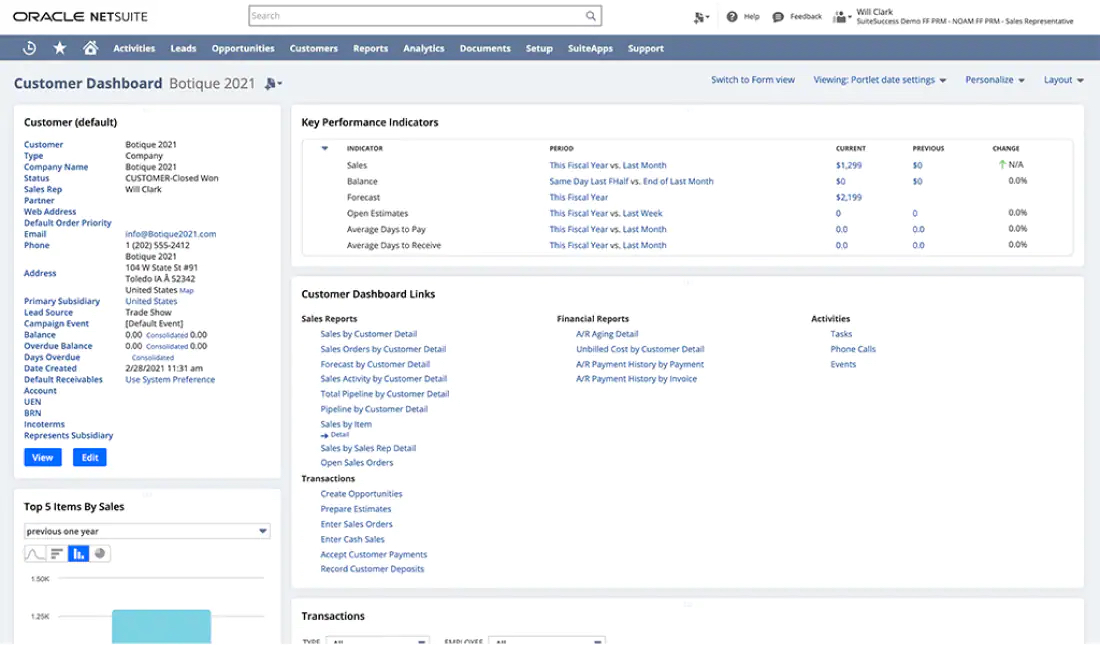
Oracle makes the list again with another one of the best CRM software options on the market. Netsuite is a SaaS CRM tool that allows you to build and maintain relationships with clients across the entire customer journey to improve customer retention.
It features everything you’d expect to see in a traditional CRM system, including sales force automation, marketing automation, and customer service management.
NetSuite CRM best features:
- Highly customizable custom dashboards and reports across the CRM platform
- Built-in shortcuts to quickly find pages you use the most
- Easy to integrate with third-party applications
NetSuite CRM limitations:
- Some users wish there were more customization options for sales orders
- Slow loading times cause concern for some users
NetSuite CRM pricing:
- Contact for pricing
NetSuite CRM ratings and reviews:
- G2: 4/5 (2,600+ reviews)
- Capterra: 4.1/5 (1,300+ reviews)
8. SugarCRM
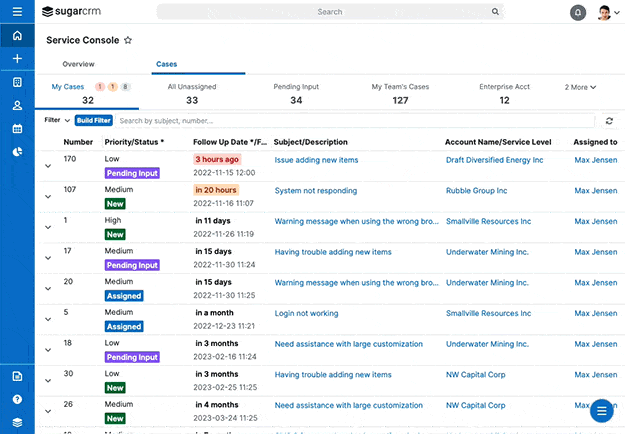
SugarCRM blends sales, service, and marketing tools to bring you a platform that empowers you to increase efficiency, drive revenue, and create better customer experiences.
On the sales side, SugarCRM brings your focus on the right opportunities, manages your sales and lead pipelines, and improves outcomes using AI-based predictive forecasting in its CRM solution.
And the addition of their Service and Marketing tools create an all-in-one place to run your customer and marketing operations.
SugarCRM best features:
- Customizable to match your unique business needs
- Track the entire user journey with a clear timeline of customer interactions
- Easy to use on mobile devices
SugarCRM limitations:
- Some users report that there’s a lack of expected CRM features
- More advanced reporting features would be appreciated, some users report
SugarCRM pricing:
- Sell plan: $49/month per user (3 user minimum, billed annually)
- Serve plan: $80/month per user (3 user minimum, billed annually)
- Enterprise plan: $85/month per user (3 user minimum, billed annually)
- Market plan: $1,000/month (for up to 10,000 contacts)
SugarCRM ratings and reviews:
- G2: 3.8/5 (600+ reviews)
- Capterra: 3.8/5 (300+ reviews)
9. Freshsales
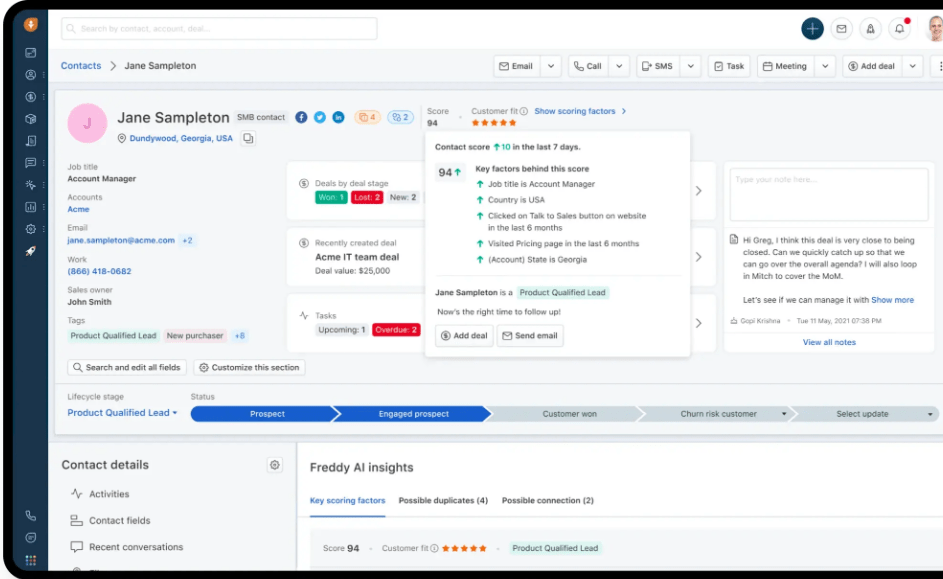
Freshsales is Freshworks’ powerful sales CRM tool. This platform makes it easier to drive revenue growth and productivity.
You get intelligent sales insights, automation features, and a unified CRM system for your sales, customer support, and marketing teams.
Freshsales also benefits from Freddy AI to help you prioritize leads and customers with AI-powered lead scoring.
Freshsales best features:
- Get notified about real-time deal opportunities from clients
- Features like built-in e-signatures make closing deals faster
- Easy access to the support team
Freshsales limitations:
- With so many filtering options, some users find the experience overwhelming
- Some users report that the traditional CRM features feel limited
Freshsales pricing:
- Free CRM: Free
- Growth: $18/month per user
- Pro: $47/month per user
- Enterprise: $83/month per user
Freshsales ratings and reviews:
- G2: 4.5/5 (1,000+ reviews)
- Capterra: 4.5/5 (500+ reviews)
10. Zoho CRM
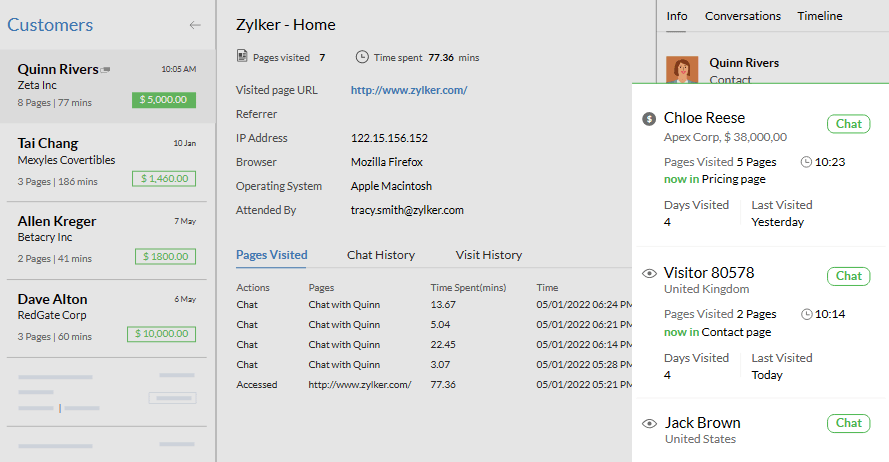
Zoho CRM claims to be the fastest implementation in the enterprise CRM market, giving teams the opportunity to use the features more quickly.
The platform is designed to help teams build stronger relationships with customers through segmentation, predictive intelligence, and KPIs.
It also promotes productivity through workflow, process, and campaign automation. ✨
Zoho CRM best features:
- User-friendly interface and dashboards
- Customize the experience with automations, custom fields, and workflows
- Get access to all Zoho apps in one place with Zoho One
Zoho CRM limitations:
- There may be a steep training curve for new users
- Some users wish the reporting features were more robust
Zoho CRM pricing:
- Free trial available
- Standard: $20/month per user
- Professional: $35/month per user
- Enterprise: $50/month per user
- Ultimate: $65/month per user
Zoho CRM ratings and reviews:
- G2: 4/5 (2,400+ reviews)
- Capterra: 4.3/5 (6,300+ reviews)
Check out these Zoho alternatives!
Benefits of Using a SaaS CRM to Manage Customer Data
Using a SaaS CRM can provide you with numerous benefits. Some of the main advantages include:
- Centralized data: With a SaaS CRM, all your customer and sales data is stored in one place, accessible to everyone on your team.
- Improved communication: The ability to track interactions and conversations with customers allows for better communication and collaboration within your team.
- Streamlined processes: Automation features in SaaS CRMs can help streamline manual tasks, freeing up time for your team to focus on other important tasks.
- Real-time insights: With reporting and analytics features, you can get real-time insights into your sales performance and make data-driven decisions.
- Increased efficiency: With everything stored in one place and automation features, a SaaS CRM can improve efficiency within your team.
- Scalability: As your business grows, a SaaS CRM can easily scale with you, allowing for more users and data storage as needed.
The Difference Between CRM and SaaS CRM
The main difference between a traditional CRM and a SaaS CRM is the delivery method. Traditional CRMs are installed on-premise, requiring hardware and IT resources for implementation. On the other hand, SaaS CRMs are cloud-based, meaning they can be accessed through a web browser or mobile app with no installation required.
Discover a Better Alternative to Traditional CRM for SaaS Platforms
Clearly, there’s an abundance of SaaS CRM options out there. But if you’re looking for a future-focused alternative to a SaaS CRM, try ClickUp for free.
Our productivity platform gives you everything that a traditional CRM does. Plus, you get the added benefit of managing all your tasks, documents, customers, marketing, and goals in one place. ?




